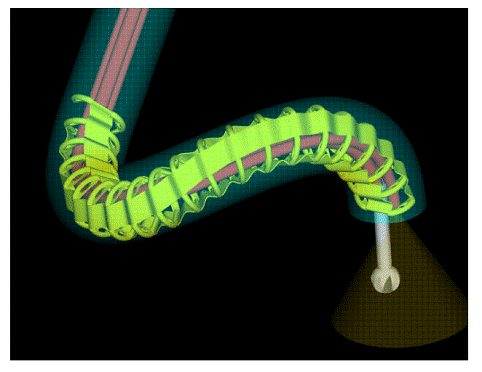|
News and Events > NIH Research at Quest and CU to Develop Endoscopes
Contact: Alan Kopelove Contact: Lindsay Polak
Quest Product Development Corporation Technology Transfer Office
(303) 670-5088x11 University of Colorado
alank@quest-corp.com (303) 735-5518
lindsay.polak@cu.edu
FOR IMMEDIATE RELEASE
NIH Funds Research at Quest Product Development and University of Colorado to Develop Next Generation Flexible, Digitally-Controlled Endoscopes
Denver, CO (October 2006) - Quest Product Development, with partner University of Colorado, has completed Phase I research funded by a National Institutes of Health (NIH) Small Business Technology Transfer (STTR) grant to develop a “proof of concept” MicroFlex scope, an innovative, ultra-flexible, digitally-controlled endoscope that will allow minimally invasive sinus diagnosis and surgery. MicroFlex provides entry into previously inaccessible spaces, direct visualization of tissues and controllability for improved diagnostic, therapeutic and surgical procedures.
This new technology combines innovations in actuation, sensing, control and assembly at small scales using advanced metal alloys, Integrated Circuit fabrication and micro-actuator technologies, to produce 3mm (0.12”) and 1mm (less than 0.04”) diameter ultra-flexible devices.
The sinus application, the first of many potential applications of this technology, was selected due to the prevalence of chronic sinusitis and the challenge of surgery and treatment in these difficult anatomical structures. Chronic sinusitis affects approximately 33 million Americans each year and has become one of the most widespread chronic diseases. Millions of diagnostic procedures are conducted each year to attempt to visualize and diagnose problems in the sinus structures. In 2006, approximately 770,000 sinus surgeries were performed in the U.S. Current endoscopes do not provide the flexibility to access, directly visualize and effectively perform sensitive procedures in remote sinus structures. Access, visualization, and surgeon confidence are factors affecting patient safety and minimizing complications in diagnosis and surgery.
Research was conducted by Dr. Dale Lawrence, a University of Colorado professor and MicroFlex inventor, Dr. Todd Kingdom, Director, Rhinology and Sinus Surgery at the University of Colorado at Denver and Health Sciences Center’s School of Medicine, and a product engineering team from Quest Product Development. In addition to the 3mm scope designed for sinus surgery, a second NIH grant funded research demonstrating that MicroFlex technology can be fabricated as small as 1mm diameter, which will allow access into areas of the lungs not currently possible for diagnosis and treatment of lung diseases including cancer. “We’re excited about the potential of this technology to access small areas of the anatomy,” said Dr. Dale Lawrence. Ultimately, MicroFlex technology may provide a useful tool for diagnostic and surgical care for a variety of medical uses including ear-nose-throat, lung, neurosurgery, neonatal and cardiac applications.
An NIH Phase II STTR grant application has been submitted for $992,000, which would fund the development of MicroFlex prototypes and begin testing their capabilities in animal and human studies. “Successful prototype development and testing would lead to commercialization of this innovative technology” said Dr. Lawrence, “our goal is to improve heath care and provide a new frontier in minimally-invasive surgery.”
Figure. CAD model shows MicroFlex’s unique fabrication in an endoscope system

About Quest Product Development
Quest Product Development is a specialized engineering and product development company that focuses on medical products and analytical systems. Quest provides visionary product design and rapid development services to a clientele ranging from entrepreneurs and small start-ups to well-known international corporations. We have helped bring to market about 65 medical products and 50 analytical systems for laboratory or field measurements, and supported SBIR/STTR grants from NIH, DOD, NASA and NIST. Our product development expertise benefits the commercialization of MicroFlex technology through strategic partners or licensing agreements to companies with existing distribution channels to insure that products reach and benefit healthcare providers and consumers.
About University of Colorado
The University of Colorado is a three-campus system with campuses in Boulder and Colorado Springs, and a Denver and Health Sciences Center campus. The Denver and Health Sciences Center is home to a full range of undergraduate and graduate degree programs, including schools of medicine, nursing, pharmacy, and dentistry, as well as a teaching hospital. The downtown Denver location puts it at the heart of Colorado’s capitol, while the burgeoning Fitzsimons campus location in Aurora puts the university on the forefront of biotechnology development and innovation. The Fitzsimons campus is adjacent to the Colorado Bioscience Park, providing opportunities to take University research discoveries into the stream of commerce at an accelerated rate through affiliation with biotech companies in the research park. For more information about the Health Sciences Center, visit the Web site at www.uchsc.edu or the UCDHSC Newsroom at http://www.uchsc.edu/news.
For additional information, contact:
Alan Kopelove Lindsay Polak
Quest Product Development Technology Transfer Office
(303) 670-5088x11 University of Colorado
alank@quest-corp.com (303) 735-5518
lindsay.polak@cu.edu
|